ASTANA – The official three-day visit of President Kassym-Jomart Tokayev to Vietnam, featuring intensive discussions and business meetings, has marked a historic moment in the diplomatic relations between the two nations. Among the highlights were twelve agreements, an ambitious goal to boost bilateral trade to $1 billion, and initial steps toward a visa-free regime.
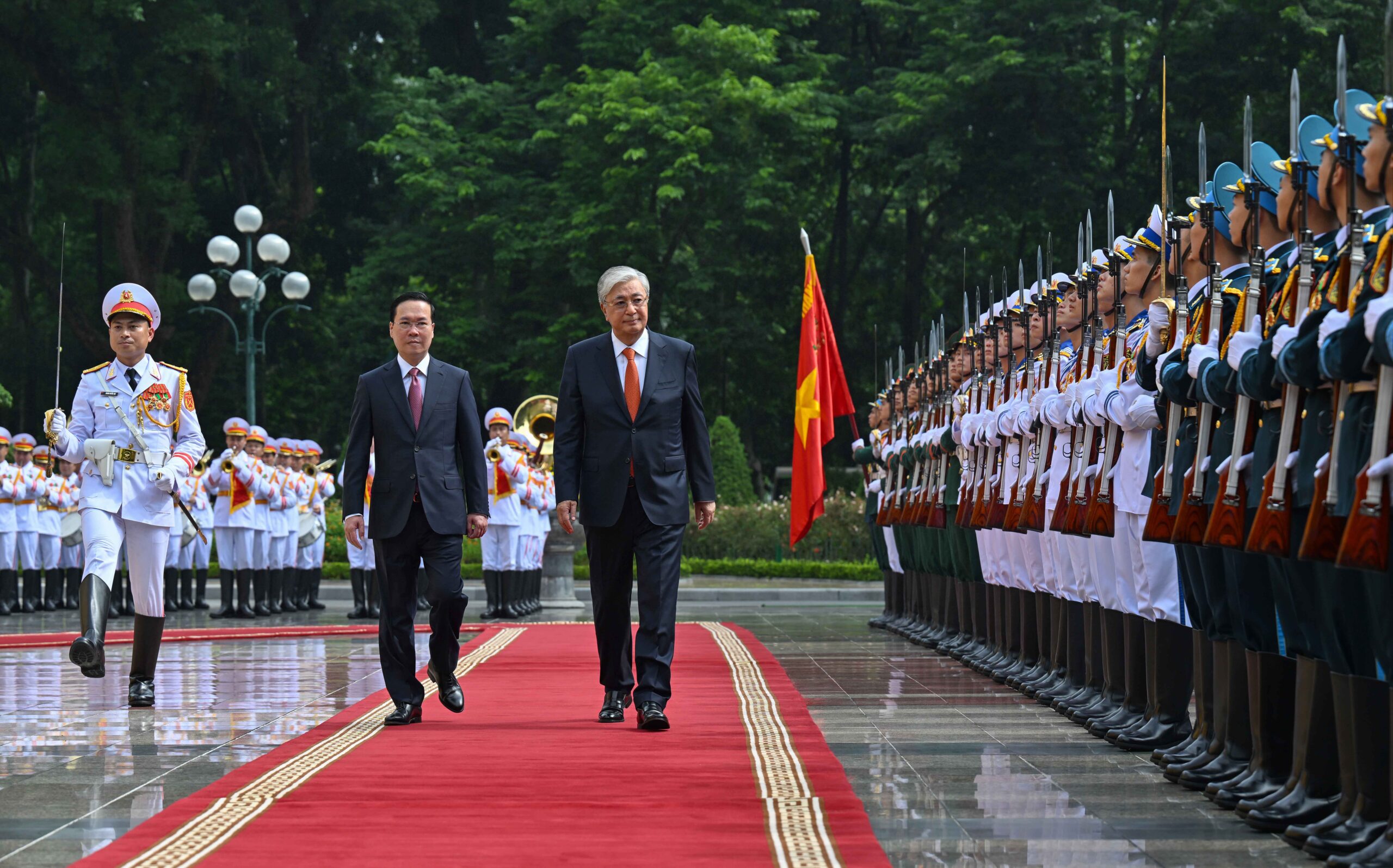
Tokayev and Vo Van Thuong during an official welcoming ceremony at the Presidential Palace in Hanoi on Aug. 21. Photo credit: akorda.kz
The visit, which was initially scheduled for June 11-13 but was postponed due to the wildfires in the Abai Region, opened with a grand ceremonial reception at the Presidential Palace, where President Tokayev was received by Vietnamese President Vo Van Thuong.
The subsequent high-level talks covered various important topics, such as trade expansion, economic growth, investment, energy cooperation, advancements in transport and logistics, and agro-industrial, cultural and humanitarian cooperation.
Since establishing diplomatic ties in June 1992, the countries have enjoyed a strong relationship. In 2008, Vietnam opened an embassy in Kazakhstan, and Kazakhstan reciprocated in Hanoi in 2013.
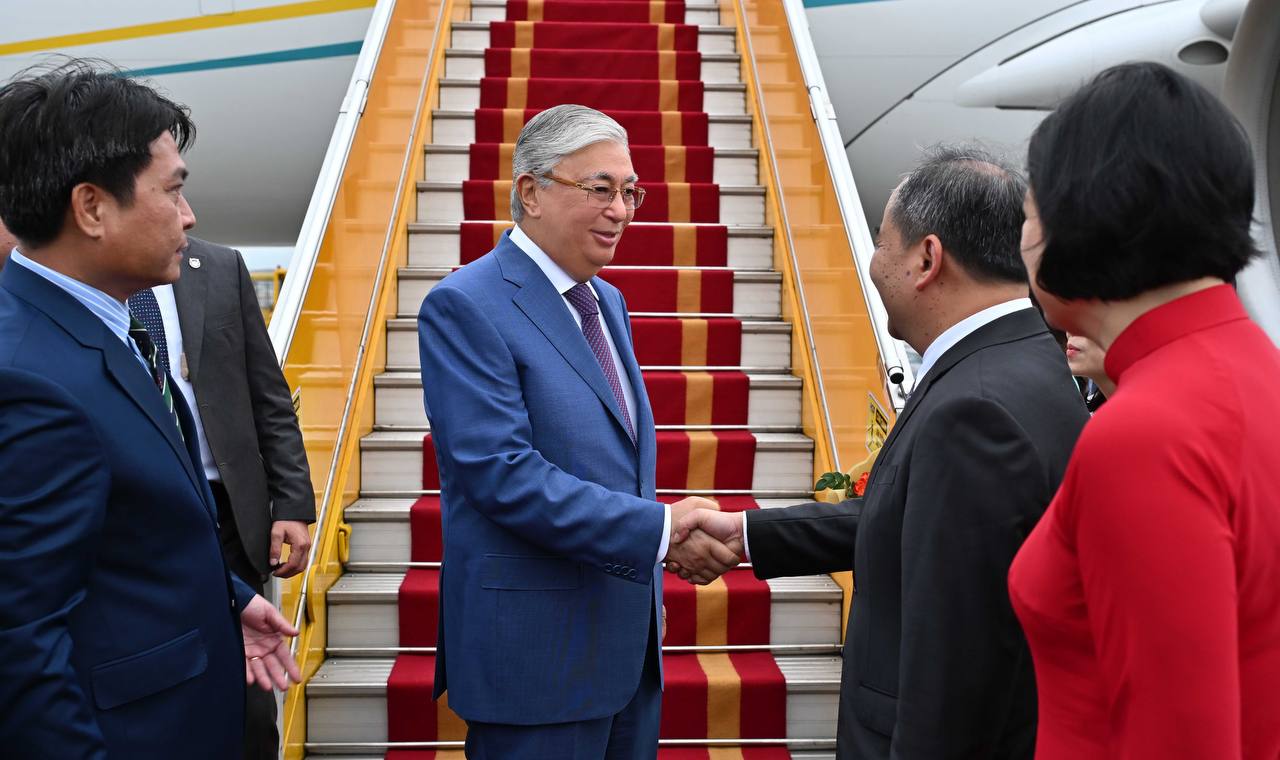
Chairman of the President Office Le Khanh Hai welcomes President Tokayev at an airport on Aug. 20. Photo credit: akorda.kz
President Tokayev expressed his appreciation for the visit, his first to Vietnam as the President of Kazakhstan.
“I attach the utmost importance to this visit. In Kazakhstan, they treat your state and your people with great respect,” Tokayev told his counterpart.
Vietnam’s President Vo Van Thuong said his country “remembers and thanks the people of Kazakhstan for the valuable support provided in the struggle for national liberation and reunification of the country in the past.”
“Vietnam attaches great importance to traditionally friendly relations with Kazakhstan and considers your country an important partner in Central Asia,” he told Tokayev.
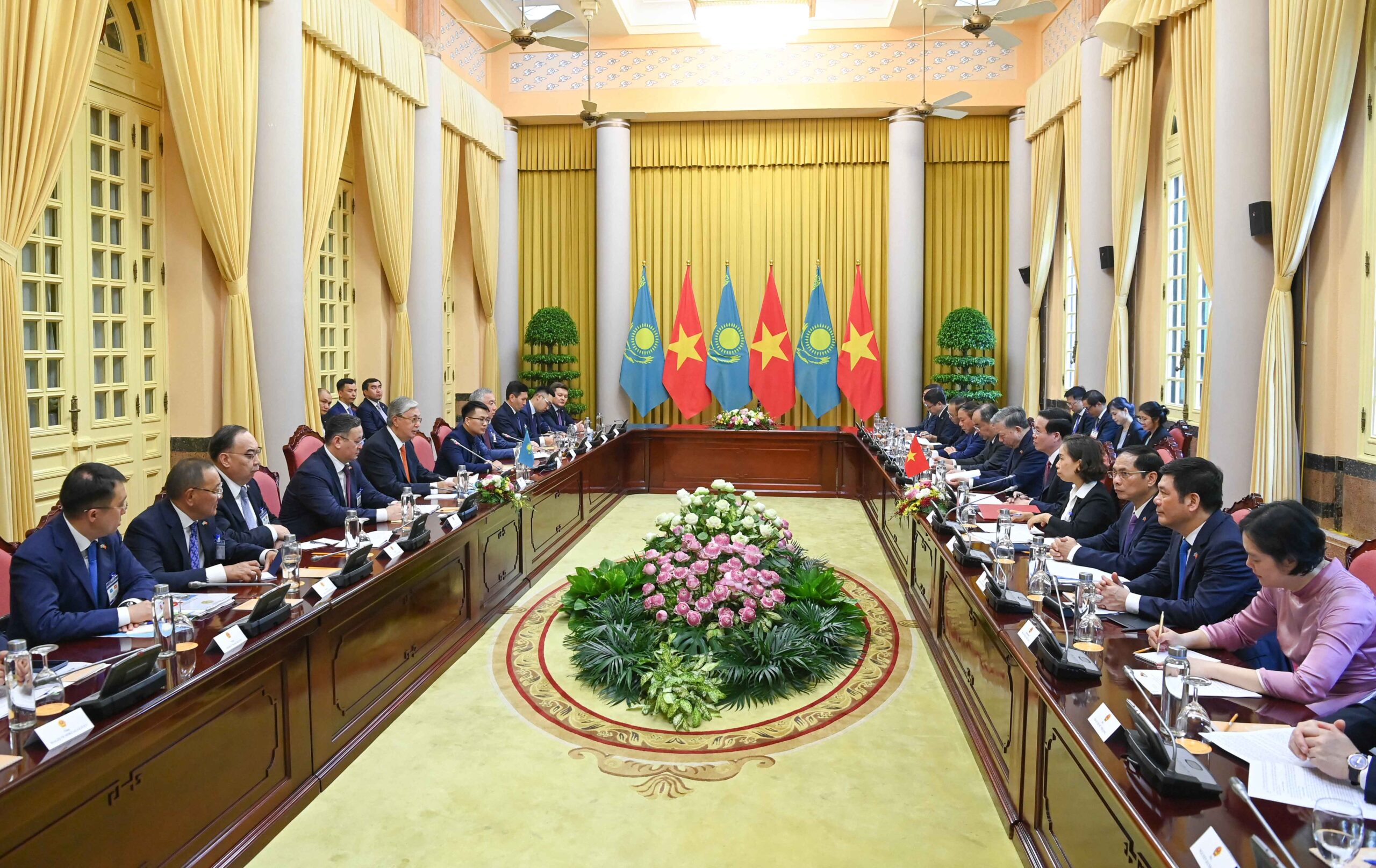
The two leaders and their delegations during the meeting in Hanoi. Photo credit: akorda,kz
The two leaders intend to promote multilateral cooperation, including through the Conference on Interaction and Confidence Building Measures in Asia (CICA). In October, Vietnam’s Vice President Vo Thi Anh Xuan attended the sixth CICA summit in Astana.
Economic success underpins cooperation
President Tokayev commended Vietnam’s remarkable economic achievements, which he deemed a “solid foundation for further cooperation.”
Vietnam is one of the fastest-growing economies in Asia. According to a World Bank report, Vietnam’s economic growth is forecasted to accelerate from 3.7% in the first half of 2023 to 5.5% in 2024 and 6% in 2025.
“We pay significant attention to the economic and political interaction between our countries and fully appreciate the huge economic potential of Vietnam, as well as the country’s authority in the international arena,” said Tokayev.
President Tokayev highlighted the substantial growth in mutual trade, which exceeded half a billion dollars in the preceding year. According to the data from the Bureau of National Statistics, bilateral trade reached $525.7 million in 2022, with exports amounting to $125.6 million and imports of $400.1 million.
In the first half of 2023, trade has surpassed the 2022 mark, reaching $610.9 million, compared to just $174.7 million in the first half of 2022.
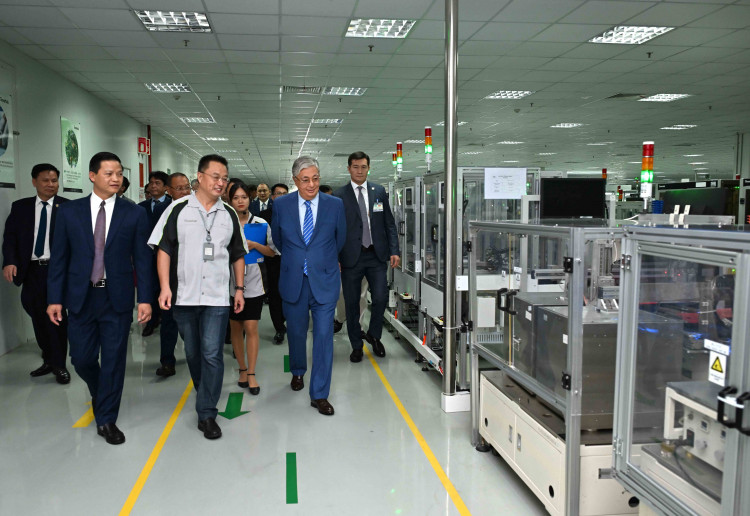
The President of Kazakhstan visited the GoerTek production complex, part of a global-scale technological innovation enterprise with an average annual income of $2.8 billion. Photo credit: akorda.kz
Kazakhstan primarily exports non-ferrous and ferrous metals, ores and concentrates to Vietnam and imports household and office electronics.
The volume of exports from Kazakhstan increased by 4.7 times from $24.6 million to $116.7 million in the first half of 2023, whereas imports rose by 3.3 times from $150.1 million to $494.2 million, primarily driven by a 3.8-fold increase in the imports of smartphones.
In terms of imports to Kazakhstan, smartphones play a significant role, accounting for 51.4% of the total imports from Vietnam. The value of smartphones imported increased from $67 million to $254 million this year. Another striking aspect is the astronomical growth in Kazakhstan’s imports of color image monitors, which surged 1,200 times from a mere $59,000 to $71.2 million, making up 14.4% of all imports for the first half of the year.
Zinc dominates the export list with a 71.5% share, amounting to $83.4 million in value. Kazakhstan, a major producer of zinc with a well-developed mining industry, is geographically well-placed to supply this commodity to Vietnam. Refined lead is the second-largest export commodity, accounting for 27.7% of total exports, or $32.3 million. The proximity and resources of Kazakhstan make it a highly advantageous trading partner for Vietnam, especially in the mining sector.
$1 billion target in trade
Both leaders have ambitiously set the target of achieving the $1 billion mark by the end of the year.
Vietnam’s free trade agreement with the Eurasian Economic Union, where Kazakhstan is a member, also facilitates trade between the two countries.
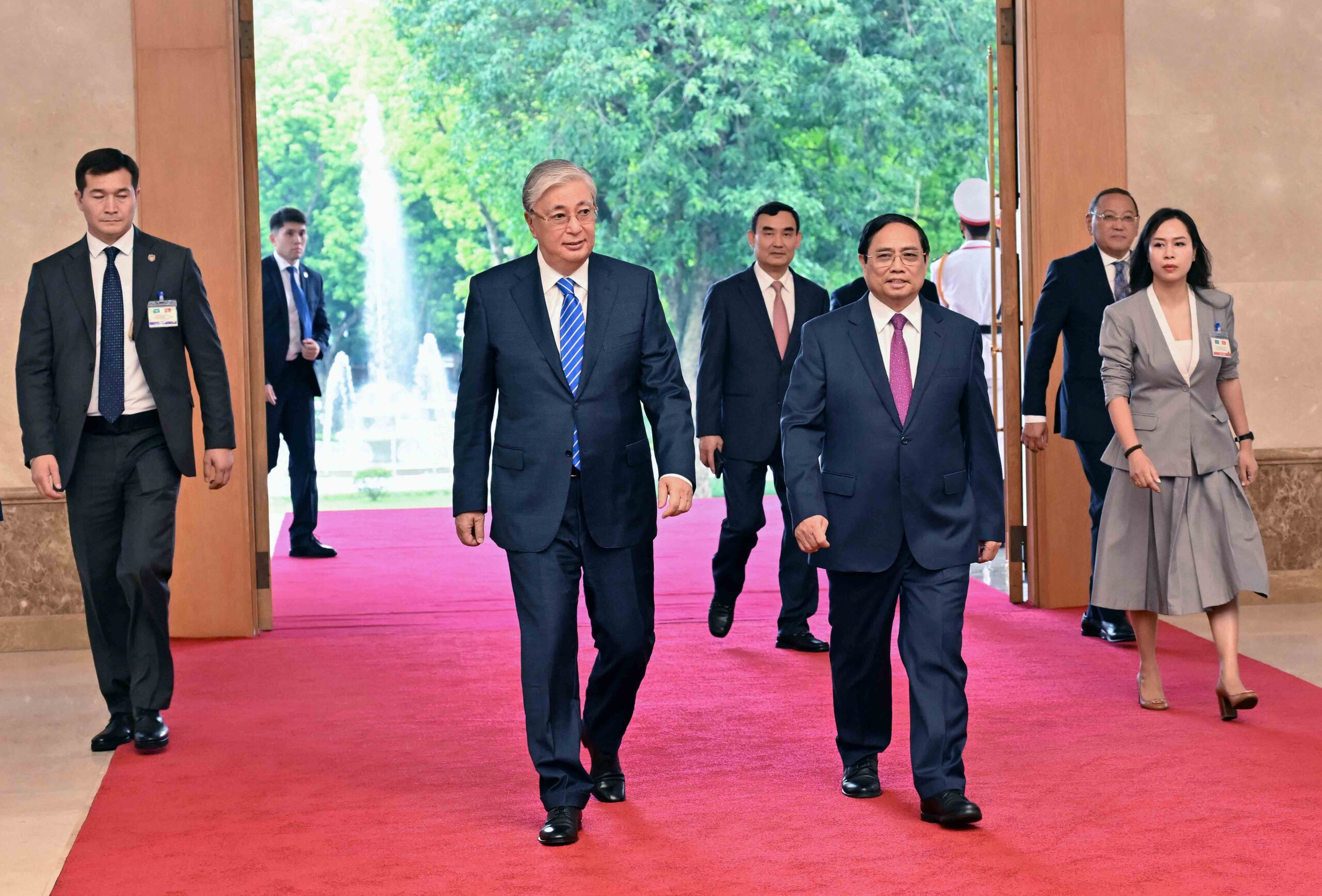
President Tokayev and Prime Minister of Vietnam Pham Minh Chinh are heading to their meeting on Aug. 21. Photo credit: akorda.kz
Signed in May 2015 and implemented in October 2016, Vietnam was the first country to sign such an agreement with the EAEU, creating a plethora of export opportunities for Vietnamese enterprises.
According to Vietnam’s Prime Minister Pham Minh Chinh, whom Tokayev also met on Aug. 22, there are ample opportunities for the two nations to step up collaboration. He proposed that Kazakhstan further simplifies the entry process for Vietnam’s exports, including agricultural and forestry products, clothing, and timber.
Agreements signed and promising areas
Twelve agreements were signed during the visit, all aimed to help the countries facilitate trade. These documents showcase the multifaceted nature of the growing partnership between Kazakhstan and Vietnam in sectors such as oil and gas, investments, transport and logistics, tourism, and visa-free travel.
One of the key documents is the Joint Action Plan for Trade and Economic Cooperation, outlining a roadmap for intensified collaboration between the governments of both nations from 2023 to 2025.
The document aims to broaden cooperation in the field of trade, investment, and agriculture. Specifically, it focuses on expanding the range of goods traded, collaborating in special economic zones and standardization agencies, transferring Vietnamese agricultural technologies, and fostering cooperation between cities such as Almaty and Ho Chi Minh, as well as Aktau and Da Nang. It also calls for the creation of a Kazakh-Vietnamese Business Council.
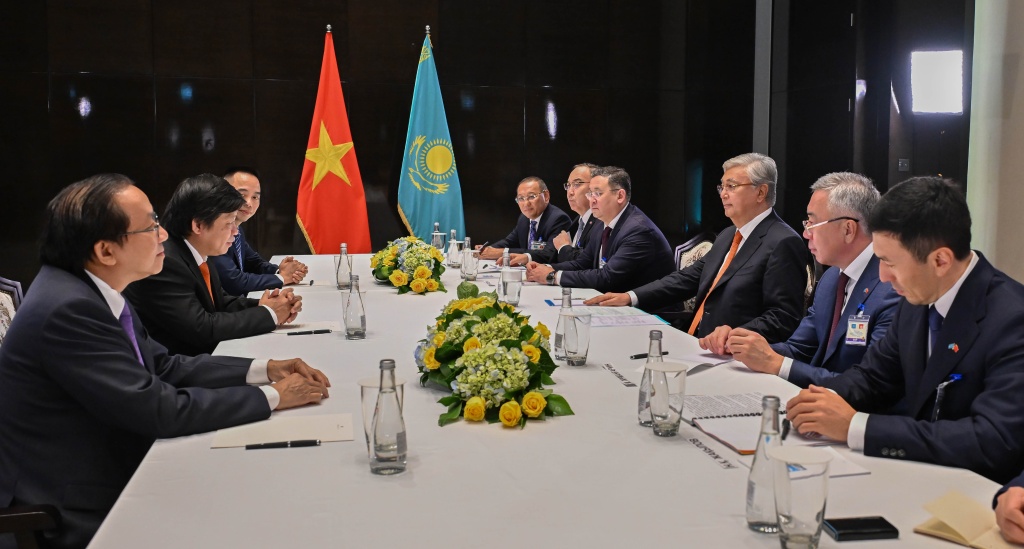
The Kazakh President during the meeting with SOVICO Group top management on Aug. 21. Photo credit: akorda.kz
Sovico Group, Vietnam’s leading company with a diverse portfolio of investments, including banking and finance, aviation, real estate, energy, and tourism, signed memoranda of understanding with Kazakhstan’s KazMunayGas in oil and gas cooperation and Kazakhstan Temir Zholy, the national railway operator, to promote cooperation in transport and logistics.
In a meeting with Sovico Group Chairman Nguyen Thanh Hung, President Tokayev emphasized Kazakhstan’s strong interest in joint investment projects. Nguyen outlined the company’s plans to build a trade and logistics hub in Kazakhstan. VietJet Air, a low-cost airline affiliated with the group, also plans to expand the number of flights to Kazakhstan.
The Kazakh Foreign Ministry’s Investment Committee signed a memorandum of cooperation with the Investment Agency of Vietnam. According to the committee’s chairman, Ardak Zebeshev, this memorandum “outlines the potential for collaboration across various areas, including innovation, startups, finance, financial hubs, energy, renewable energy sources, mining, metallurgy, and the petrochemical industry.”
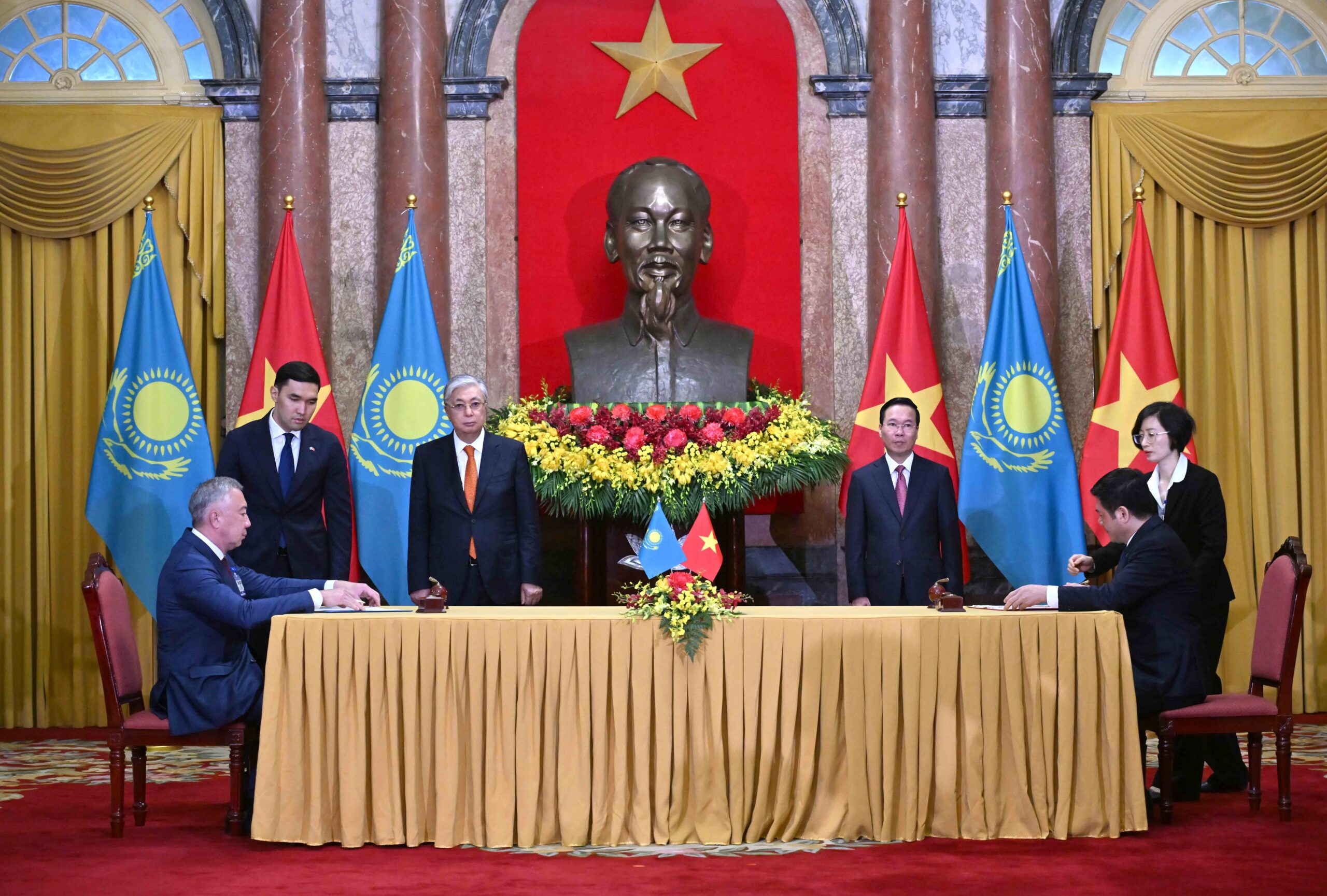
Deputy Prime Minister – Minister of Trade and Integration of Kazakhstan Serik Zhumangarin and Minister of Industry and Trade of Vietnam Nguyen Hong Zien sign an intergovernmental joint action plan. Photo credit: akorda.kz
Another agreement the committee signed was with the Crystal Bay Group. According to Zebeshev, its aim is to implement an investment project designed to enhance the tourism infrastructure in the Almaty Region, particularly Ak Bulak Mountain Village.
Kazakhstan’s QazTrade agency, which is tasked with developing trade and promoting non-commodity exports, signed an agreement with Vietnam’s Trade Promotion Agency.
In March, QazTrade arranged a trade and economic mission to Vietnam, showcasing Kazakh producers of food products, organic fertilizers, feed additives, and IT service providers. The mission was part of a broader Kazakh delegation headed by Vice Minister of Trade and Integration Kairat Torebayev.
Kazakhstan is ready to export quality agricultural products to Vietnam. Discussions have been ongoing since the first meeting of the Sub-Committee on Agricultural Cooperation in Hanoi in March. Addressing the gathering, Vice Agriculture Minister Erbol Taszhurekov said Kazakhstan is interested in supplying Kazakh grain, wheat flour, pasta and confectionery products to the Vietnamese market and is ready to export meat products, milk, cereals and other types of high-quality agricultural products.
Experts suggest that Vietnam can serve as a window to Southeast Asia for Kazakhstan and act as a bridge, supporting stronger cooperation with the Association of Southeast Asian Nations (ASEAN) and Southeast Asian countries more broadly.
Cultural bridges and people-to-people ties
While economic growth is pivotal to diplomatic relations, the visit also highlighted the importance of cultural exchanges and people-to-people ties. President Tokayev’s visit to significant cultural sites in Hanoi, such as the Military Museum and the Chu Dau pottery village in Hai Duong province, demonstrated a genuine interest in Vietnam’s history and culture.
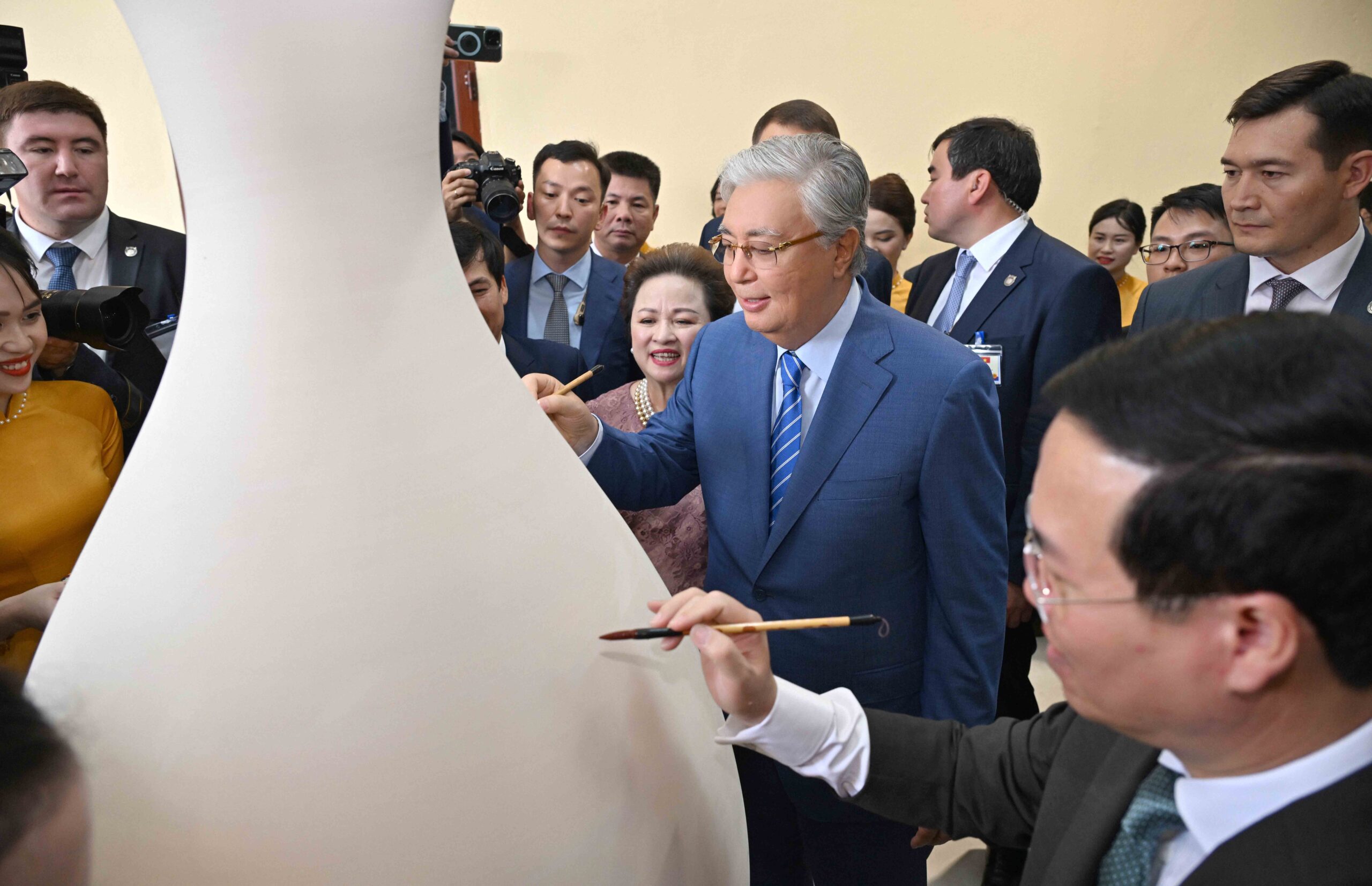
The presidents of Kazakhstan and Vietnam sign the pottery items during their visit to Chu Dau pottery village. Photo credit: akorda.kz
The agreement for a visa-free regime and the initiation of related procedures are welcome developments for both nations, as they will enhance people-to-people ties and ease travel for business representatives from both countries.
As tourism rebounds post-COVID, the launch of direct flights between Almaty and Nha Trang in October quickly made Vietnam a popular destination among Kazakh travelers, captivated by the nation’s delectable cuisine, warm hospitality, and sandy beaches.


